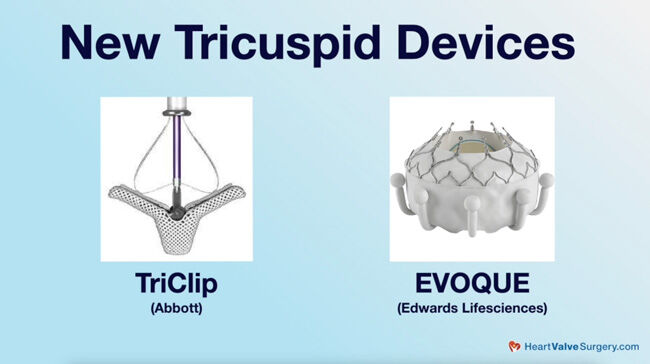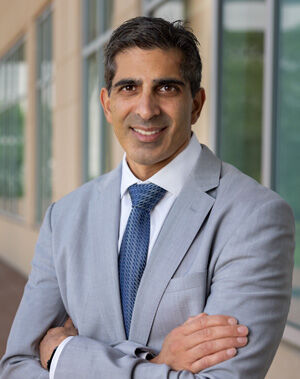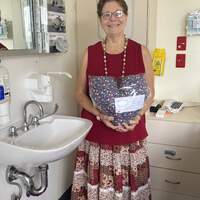Doctor Insights: The Tricuspid Valve Is Not The “Forgotten Valve” Anymore
Written By: Adam Pick, Patient Advocate, Author & Website Founder
Medical Expert: Gorav Ailawadi, MD, Chair of Cardiac Surgery, Michigan Medicine
Page Last Updated: June 6, 2025
For decades, the tricuspid valve has been referred to as the “forgotten valve”. However, at the recent 59th Annual Society of Thoracic Surgeons Conference, I learned that new research and new medical devices are enhancing physician awareness and treatment of this neglected valvular defect.
“The exciting thing about the tricuspid valve is that it is quite the opposite of the forgotten valve,” shared Dr. Gorav Ailawadi. Why did Dr. Ailawadi make this statement? What should patients know about the challenges and the opportunities of tricuspid valve therapy? Get answers to these questions and more in this special interview with Dr. Ailawadi.
Key Learnings About Tricuspid Valve Disease
Here are key learnings shared by Dr. Ailawadi about tricuspid valve disease and its treatment:
- Tricuspid valve disease patients are often asymptomatic which can make the diagnosis difficult. “The problem with the tricuspid valve is patients often times don’t have symptoms, or their symptoms are very subtle, like being fatigued or having some swelling in their legs,” states Dr. Ailawadi. “It’s not until the heart gets much weaker that they present with more significant symptoms. At that time, sometimes it’s too late to offer anything.”
- There is often additional risk for treating the tricuspid valve. “The treatment has only been tricuspid valve surgery. Unfortunately on paper, most patients have a high mortality risk,” states Dr. Ailawadi. “It’s not because it’s hard to get to the tricuspid valve but rather, it’s a sign that the right side of the heart is very weak, which affects the liver, the kidneys, and the other organs.”
- The right side of the heart is more sensitive than the left side of the heart. “The right side of the heart is so much more sensitive,” states Dr. Ailawadi. “If you think about the left side of the heart, it’s like a balloon that you buy from the store. You blow up, and it has immediate recoil when you release it. The right side of the heart, you blow up the balloon, you let it sit in the sun for a week, and you try to release the air. It has no recoil.”

- There are several new medical devices – including transcatheter therapies – that are currently being tested or in clinical trials for the treatment of tricuspid valve disease. “The exciting thing about the tricuspid valve, it is quite the opposite in terms of the forgotten valve,” states Dr. Ailawadi. “There are so many different devices that are being tested. Many are in trials to replace the tricuspid valve or repair the tricuspid valve essentially to try to help these patients that are so ill and frail have a better quality of life.”
- According to Dr. Ailawadi, patients with tricuspid valve disease may not have a heart murmur.
- Dr. Ailawadi’s advice for patients is to be proactive. “The way patients may find out about it tricuspid valve disease is if they have a lot of swelling that needs to be treated, or they just feel really fatigued. Certainly, patient should try to get an echo and find out about how the heart is functioning, how the valves are functioning,” states Dr. Ailawadi. “Patients that have had a pacemaker, they have a much higher chance of having a leaking tricuspid valve, so those patients should absolutely be on the lookout. Ultimately, if you see a report that your tricuspid valve is leaking, talk to your doctor about it. Ask for a referral if you need.”
Many Thanks Dr. Ailawadi & Michigan Medicine!
Many thanks to Dr. Gorav Ailawadi for taking the time to share his clinical experiences and new research with our patient community. As I have received many patient questions about tricuspid valve disease, it was great to learn about how physicians and medical companies are coming together to help tricuspid valve patients.
Related Links:
- Patient Webinar: Advances in Tricuspid Valve Therapy
- Surgeon Q&A: What About Tricsupid Valve Surgery for Patients with Pacemakers?
Keep on tickin!
Adam
P.S. For the deaf and hard of hearing members of our community, I have provided a written transcript of my interview with Dr. Ailawadi below.
Video Transcript:
Adam Pick: Hi, everybody, it’s Adam with heartvalvesurgery.com, and we’re at the Society of Thoracic Surgeons Conference. I am thrilled to be joined by Dr. Gorav Ailawadi, who’s the chairman of cardiac surgery at Michigan Medicine in Ann Arbor, Michigan. Gorav, thanks for being here today.
Dr. Ailawadi: Hi, excited to be here. Thank you.
Adam Pick: Yeah, so we have a lot of questions from patients about the tricuspid valve. In the past, it’s been referred to as the forgotten valve, and you’re doing a lot of sharing about research and treatment techniques here at the conference. What can you help our patients learn about the latest updates on the tricuspid valve?
Dr. Ailawadi: Sure, well, first of all, the problem with the tricuspid valve is patients often times don’t have symptoms, or their symptoms are very subtle, like being fatigued or having some swelling in their legs. It’s not until the heart gets much weaker that they present with more significant symptoms. At that time, sometimes it’s too late to offer anything.
Adam Pick: In terms of treating the tricuspid valve, I’ve heard there might be some sensitivity or concern from a physician’s perspective when doing that. Can you share with our patients what might be maybe an incremental risk for treating at the tricuspid valve?
Dr. Ailawadi: So typically, the treatment has only been tricuspid valve surgery. Unfortunately on paper, most patients have a high mortality risk, and it’s not because it’s hard to get to the tricuspid valve but rather, it’s a sign that the right side of the heart is very weak, which affects the liver, the kidneys, and the other organs.
Adam Pick: Dr. Ailawadi, I’ve got to ask you, why is the risk higher for the tricuspid valve?
Dr. Ailawadi: It’s because the right side of the heart is so much more sensitive. If you think about the left side of the heart, it’s like a balloon that you buy from the store. You blow up, and it has immediate recoil when you release it. The right side of the heart, you blow up the balloon, you let it sit in the sun for a week, and you try to release the air. It has no recoil. That’s essentially what the right side of the heart, or the right ventricle, does. It’s very sensitive to fluid and when you have a leaking tricuspid valve, it’s over-distended, and it doesn’t have the same recoil. It doesn’t get back to more normal size, and that ultimately affects the liver, and the kidneys, and other organs.
Adam Pick: I’ve got to ask you, Dr. Ailawadi, you and I have known each other for a long time. I saw you perform a mitral clip prior to its FDA approval. I’ve got to ask you. I know that you’re looking at the innovations of valvular therapy. Are there any new devices that are on the horizon that you’re working with or are in clinical trials?
Dr. Ailawadi: So the exciting thing about the tricuspid valve, it is quite the opposite in terms of the forgotten valve. There are so many different devices that are being tested. Many are in trials to replace the tricuspid valve or repair the tricuspid valve essentially to try to help these patients that are so ill and frail have a better quality of life.
Adam Pick: Obviously there’s been a lack of awareness around this disease for a long time. Do you think this is something where patients should be proactive if they’ve heard they might have a murmur? Maybe the physician doesn’t even think about the tricuspid valve. What should patients do?
Dr. Ailawadi: Absolutely. The one thing is a lot of these patients don’t have a murmur. The way they may find out about it is if they have a lot of swelling that needs to be treated, or they just feel really fatigued that’s getting worse. Certainly, try to get an echo and find out about how the heart is functioning, how the valves are functioning. Patients that have had a pacemaker, they have a much higher chance of having a leaking tricuspid valve, so those patients should absolutely be on the lookout. Ultimately, if you see a report that your tricuspid valve is leaking, talk to your doctor about it. Ask for a referral if you need.
Adam Pick: That is great advice. Dr. Ailawadi, on behalf of the patients at heartvalvesurgery.com, patients all over the world, thanks for the great work that you and your team are doing there at Michigan Medicine. Thanks for being here today.






